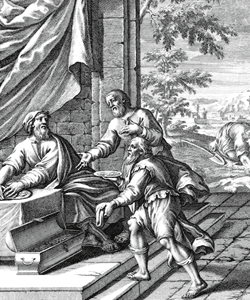In the Gospel of Matthew, much is made of two servants who multiply what they’ve been given. Five coins turn into ten. Two coins turn into four. ese two servants are like the “goody two shoes” in a chemistry class. Always getting the right answer, helping the teacher, never getting into trouble, always getting good grades, always getting the attention, always getting the praise party, always receiving accolades, seemingly without a trouble in the world.
But I’m drawn to that one servant with the least. The underdog. No profit, no party, no pat on the back from his master. I’m rooting for him because I’m rooting for us. I say that because we may see our own reflection in his story, which is a story of fear.
“Master, I knew that you are a hard man. You harvest grain where you haven’t sown. You gather crops where you haven’t spread seed. So I was afraid. And I hid my valuable coin in the ground.”
This story is not really about making money. It’s about what we do with what we’ve been given by God and how we are stewards of our own lives. There’s no celebration for the last servant with the least. It’s a lament, and it should cause us to lament for him and for every buried gift in the ground. When I hide my valuable coin in the ground, there’s no growth, no development, no flourishing, no joy in my life, because of fear. The servant was formed, or malformed by fear, going nowhere with his gifts and his life. This is not just about our coins, our value, our talents, and our gifts that we hide. This is about the way we hide ourselves because of fear.
Fear can paralyze us, making us inactive and stagnant, keeping life at a standstill, no matter with what we’ve been graced or how well we did at Duke. And fear can prevent us from making tough decisions or cause us to avoid certain people, places, or things. With fear, no one will take risks, and without risks, there will be no growth.
It doesn’t take much to realize that we live in a culture of fear. Just say North Korean nuclear missiles, ISIS, Boko Haram, gun violence, governmental surveillance, immigrants, refugees, and the shockwaves of fear will be felt. Sometimes, the media will make you fear things for no reason whatsoever. Some politicians run campaigns built on fear. We might as well stay indoors and barricade ourselves in our bedrooms or labs. But that’s exactly what fear wants—to be alone with us, to cuddle up to us and have us all to itself.
In 1819, the whale ship Essex, which is the basis for Herman Melville’s Moby Dick, set sail from Nantucket Island. There were twenty American sailors on the ship. In 1820, the ship was 3,000 miles off the coast of Chile when it was struck by a sperm whale that made a hole in the hull. The ship began to flood with seawater, so the men got into three small whaleboats as their ship sunk. They were about 1,200 miles from the closest island to the west. Some of the sailors wanted to go there, but others didn’t: They feared that cannibals lived on those islands, which was a prevalent rumor in that day. They decided not to go to the closest island and instead headed in another direction, which was farther away, even with their limited supplies of food and water.
Fear led them in another direction. Eventually, due to lack of food and water, some sailors began to die. And what happened? Ironically, the sailors end up doing the same thing they feared—eating one another.
Fear isn’t just destructive. Fear can be constructive. It can prevent you from touching a fire with a bare hand. It can prevent you from opening up the airplane door when you are 30,000 feet in the air. It can prevent you from walking in the middle of a busy highway. Fear may be a hardwired biological version of common sense. Fear, in the business world, can be viewed as “productive paranoia,” as Karen Thompson Walker puts it.
However, when fear destroys a life’s purpose and potential, it’s a tragedy. The servant buried the wrong thing. He should have buried fear. If we succumb to our fears, we won’t do the things God wants us to do, and we won’t go where God wants us to go.
So bury fear, because fear will make you smaller than God wants you to be. Bury it with love, because love is stronger than fear. Let this be the day that fear is finished.
Powery is dean of Duke University Chapel. This is adapted from his baccalaureate address to the Class of 2016.

Share your comments
Have an account?
Sign in to commentNo Account?
Email the editor